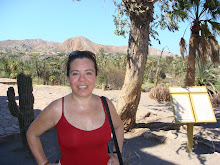Articulo sobre las elecciones
Quiero compartirles hoy un articulo publicado en el Financial Times, para que vean que de repente hay que cambiar las perspectivas que uno tiene sobre su propio pais. Por lo regular ya saben que escribo en espanol, pero ni modo de traducir esto, asi que aqui les va:
It is hard for most Americans to accept that Mexico has overtaken us in electoral administration, but let me count the ways.
First, U.S. elections mostly are run by partisan secretaries of state or local officials — not by the federal government. Mexico has a nonpartisan, fully autonomous national election commission — the IFE — whose members must be approved by two-thirds of the legislature. The IFE meetings are open to the political parties but not run by them. On election day, the IFE tracked problems and responded instantly. The IFE is one of Mexico's most respected institutions.
Second, only one U.S. state allows international observers. The IFE opens all of Mexico to international observers and facilitates access to all stages of the process.
Third, the U.S. has great difficulty recruiting and training election officials. The IFE has 13,000 full-time officials and a professional election service of 2,400. It treats election administration as a civic obligation like jury duty, and in 2006, it randomly selected 7.2 million citizens for training. Of those, it chose the best 913,000 citizens to conduct elections at 130,500 polling stations.
Fourth, U.S. voter registration lists are organized poorly by counties or states with very different ID requirements. Mexico, by contrast, has registered 95% of its citizens, and it audits and updates the list at least every year. Mexico has multiple safeguards to ensure that citizens vote only once, including a list with the photos of all citizens, indelible ink on voters' thumbs and a state-of-the-art, biometric ID card.
Fifth, massive private funding continues to taint U.S. campaigns. In Mexico, political parties receive most of their funds from the government and get free access to the media. The IFE monitors and regulates campaign contributions and expenditures.
Sixth, in the last elections, the U.S. was distracted by inaccurate, media-run exit polls. The IFE allowed 32 exit polls and party counts, but the IFE's "quick count" was announced by 11 p.m. on election day, and it was the most accurate (a margin of error of 0.3%). The IFE's announcement after the quick count that the race was too close to call gave stability for the full count to proceed, and the preliminary results came out one day later.
Finally, the U.S. judicial system is not trained for election disputes. The U.S. Supreme Court ultimately precluded a recount in the 2000 presidential election because it judged that there was not enough time before the Electoral College was supposed to vote. Mexico, meanwhile, created a specialized electoral court, or TRIFE, and has allowed two months to hear and resolve all the electoral challenges, still leaving three more months before inauguration.
Mexico's electoral system is hardly perfect. Out-of-state voters faced long lines and too few ballots at "special polling stations." There were errors in the local counts. Lopez Obrador has raised issues that must be addressed fully and fairly by the TRIFE for his party to be persuaded that the vote wasn't stolen, and that may require a complete recount.
The IFE's very competent president announced who had the most votes, but only the TRIFE can certify who is president, and its final deadline is Sept. 6.
Mexico has traveled a great distance toward democracy, but some politicians still think the election should be decided in favor of whoever can bring the most supporters into the streets or that it should be determined by a closed-door political bargain. The question now is whether Mexico will follow its old habits or its new electoral institutions.
Meanwhile, in the United States, the question is whether we will remain satisfied with our partisan, unprofessional system, driven by private contributions and that does not even permit observers, or whether we are prepared to learn from our neighbor.


0 Comments:
Post a Comment
<< Home